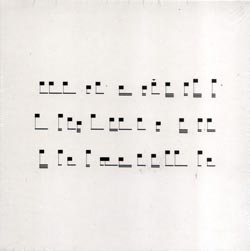
In 2008, these two masters of European improvisation met for the first time, surprisingly enough. At this point in their careers, one would think to have a fairly good idea of what to expect and with a single, startling exception, this is pretty much the case.
The disc is from a concert at Blackheath Halls, London, and the three tracks are presumably presented in the original order: solo performances by Schlippenbach and Prévost, then a duo, each lasting between about 20-25 minutes. Schlippenbach has mellowed somewhat over the years and while he's still indebted a good deal to Cecil Taylor, it's less with regard to a ferocious, jackhammer attack these days, but having more to do with Taylor's melodic approach; there are moments when one is reminded of Taylor's sublime work on recordings like Silent Tongues, though at a lower aesthetic level. Here, he incorporates several pieces of his own as well as referencing Monk and Dolphy. His playing is technically very impressive, more florid than fans from Globe Music Orchestra days might expect but there's also a perhaps necessary lack of urgency, as though having done what he was capable in an avant garde style, he's retreated to an emulative one, but one that fails to find any really different musical facets than his referents had already done, decades earlier. The resulting performance is solid, well-played and soon forgettable.
It's the Prévost solo that will knock your socks off. One might have expected either an AMM-style set with bowed metals and a subtle use of silence or something in the post-free jazz vein he tended toward in his duos with Lou Gare and other recent recordings. Instead, we hear a 20-minute, absolutely masterful dissertation in jazz drumming with roots in Roach and Blackwell; it might be one of the finest jazz percussion solos on record. He does take something from the AMM experience in that he dwells in a handful of specific areas for minutes at a time, not flying willy-nilly over his set (thus recalling Jerome Cooper's wonderful solo performances from the 70s). So he begins with brushes on drumheads, gradually adds in cymbals, proceeds to sticks on toms and rims, has a brief episode with the full set, then eventually concentrates on the cymbals to end things. Throughout, he maintains a quick rhythm with a light touch, a thread that helps the entire piece cohere beautifully. His melodic touch is astonishing-Roach would be proud. This track alone makes purchase of "Blackheath" mandatory.
The duo runs much more along expected lines, Prévost in a more "standard" free jazz mode, Schlippenbach dredging up shards of Monk (including some relative rarities like "Shuffle Boil"), injecting the melodies into a thick mix again very much out of Taylor. As with the first track, it's a solid enough affair, one that the pianist's fans will no doubt enjoy, though next to the Prévost solo, it acquires the aura of the routinely good rather than the extraordinary.
Comments and Feedback:



More Recent Reviews, Articles, and Interviews @ The Squid's Ear...


|

